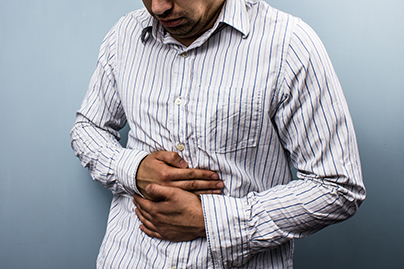Crohn’s disease is a chronic inflammatory disease in the family of inflammatory bowel diseases (IBD) that can affect any part of the gastrointestinal tract from the mouth to the anus but most commonly involves the intestines.

Crohn’s disease is a disease that is most common in Westernized areas, such as North America, Australia, and Europe, but is also spreading to developing countries as Western lifestyles, such as poor dietary habits, creep in. In the U.S. alone, it is estimated that the prevalence may be approximately 0.2%,1 and this number is getting higher over time.
Some of the potential explanations of this geographical trend include Westernized factors, such as antibiotic use, hygiene, exposures to certain infections, pollution, and diet. A higher risk follows those with a family history of the disease as well. Intestinal permeability (leaky gut) and altered intestinal bacteria seem to play an important role, but it is still not known exactly what causes Crohn’s disease.
Those with Crohn’s disease may experience some or all of the following symptoms:
For those with Crohn’s disease, improvements in nutrition, lower inflammation, and intestinal bacterial balance can occur with nutritional excellence.
Dr. Fuhrman’s general supplement protocol for adults (see Vitamin Advisor for details) includes:
Multivitamin (without beta-carotene, vitamin A, vitamin E, folic acid, copper), such as Women’s Daily Formula +D3, Men’s Daily Formula +D3, or Gentle Care Formula.
Omega-3 DHA and EPA, such as DHA+EPA Purity.
Optional: Consider adding a mixed mushroom immune supplement, such as Immune Biotect, because of the potential immune system benefits throughout life from assorted mushroom phytochemicals not normally consumed in the diet.
Additional supplements:
Probiotics: Both Crohn’s and ulcerative colitis are associated with alterations in the gut microbiome that are thought to be involved in the disease process.12 Probiotics therefore may be helpful in Crohn’s disease, however, the existing research is limited and benefit has not yet been demonstrated.13Eating foods rich in fiber and resistant starch also helps to maintain a healthy gut microbiome.
Omega-3 fatty acids: High-dose DHA and EPA have anti-inflammatory effects that may be beneficial in Crohn’s disease.14,15 Talk to your doctor to find out if high-dose omega-3s are appropriate for you.
Curcumin: Curcumin, a collection of phytochemicals from turmeric, has anti-inflammatory effects. Limited evidence suggests absorption-enhanced curcumin supplements help reduce symptoms in Crohn’s disease.1
ONLINE: All members of DrFuhrman.com can search the Ask the Doctor archives for discussions on this topic. Platinum and Diamond members can connect with Dr. Fuhrman by posting questions in the forum. Not a member? Join now.
IN PERSON or ONLINE: Book a consultation with a specialist at Longevity Rx in San Diego, California, run by Joel Fuhrman, MD and Cara Fuhrman, ND. Using nutritional protocols, cutting-edge screening tools, advanced imaging, and innovative treatments for pain and injuries, they'll create a personalized action plan to help you prevent and recover from illness, and achieve your optimal weight. Book online at Longevity Rx or call +1 (858) 367-3558
EVENTS: Join Dr. Fuhrman for an online boot camp, detox or other event. During these immersive online events, you’ll attend zoom lectures, follow a special meal plan, and have access to a special, live Q&A session with Dr. Fuhrman. Learn more about events.
The following are sample questions from the Ask the Doctor Community Platinum and higher members can post their health questions directly to Dr. Fuhrman. (All members can browse questions and answers.)
I noticed that the newsletter on inflammatory bowel disease doesn’t mention beans or nuts and seeds (except for walnuts in phase 1). Are they generally introduced at some point?
I was diagnosed with Crohn’s and am following the Eat to Live 6-week plan. I am eating lots of beans, nuts and seeds, fruit, and raw vegetables. I’m not having any adverse reactions, and my symptoms have disappeared, although they were fairly mild to begin with.
They are not excluded, but nuts/seeds should be soaked and chewed very well or blended, and beans should be eaten in small amounts (well chewed) only and then increased gradually as tolerated. There is no problem with them unless people are having problems with them.
My son was recently diagnosed with Crohn’s disease. I am trying to determine the proper diet for him. Based on the reading I’ve done, it seems he should stay away from fresh veggies, fruit, seeds, nuts, etc., however, your books seem to say that this is exactly what he needs for good health. At what point should he start to eat the right foods instead of a simple carb diet that most recommend?
First, read my newsletter on inflammatory bowel disease where I discuss a patient’s diet with active Crohn’s or colitis.
I think the diets prescribed by conventional medicine are medieval. He should never be on a simple carb diet.
He should not avoid vegetables or seeds/nuts, however, they should be steamed/soaked and pureed.
Steamed zucchini, steamed and pureed squash, artichoke hearts, peas and turnips, soft cooked and pureed black rice, seeds and nuts smoothly ground into nut butters, and avocado are all good options.
He should be started on high dose EPA and VSL#3 too.
I have Crohn’s disease. My doctor recommended animal protein to deal with low albumin. How do you feel about this? Is there a specific protocol I should be following for my condition?
Crohn’s disease is a common cause of low albumin. The protocol I use involves VSL#3, high dose fish oil, both juicing and blending, and, of course, avoidance of all oil and animal fats. No protocol can be precisely right for every person, but you can find a newsletter in the member center here that contains the general autoimmune protocol and one that contains my protocol for inflammatory bowel disease. Your albumin will rise as your inflammation decreases and the problem is in better control. In the meantime, to help improve it, also add ground hemp seeds, sunflower seeds, Mediterranean pine nuts, and one cooked egg white daily to your meals.